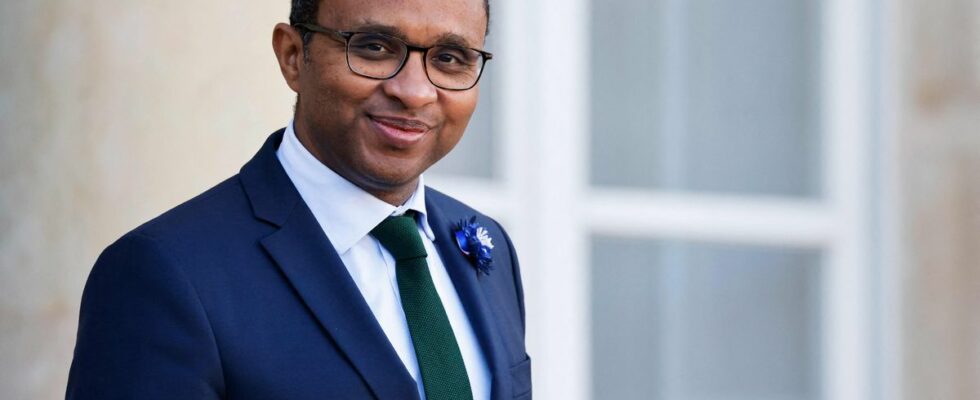“I cannot be satisfied with the fact that there are fewer female mathematicians than female mathematicians”, declared the Minister of Education, Pap Ndiaye, in an interview with Echoes published on Sunday. While participating in the mathematics conference from Monday to Wednesday, the minister unveiled his strategy aimed at “reconciling all students” with this discipline, which includes a specific focus on girls.
Because according to a Depp study published last June, at the start of the 2021 school year, 56% of girls (compared to 75% of boys) chose mathematics in specialty education in 1st class. And they were only 26% in terminal to keep this specialty (against 52% of boys), including 7% with optional education “expert mathematics” (21% for boys). This has an impact on their orientation in higher education. It should be noted that 19% of them chose to continue to study mathematics via the optional “complementary mathematics” course, but this does not lead to the same training as the math speciality.
Act early
In an attempt to encourage equality between girls and boys, the Minister has set itself objectives: to fight early on from kindergarten against gender stereotypes and promote female role models. In college, he will encourage the creation of a math club from the start of the 2023 school year, to cultivate a taste for mathematics, and set up small groups in 6th grade mathematics classes. Initiatives that leave Sophie Vénétitay, Deputy Secretary General of the SNES-FSU perplexed: “If the students enroll on a voluntary basis in a math club, there is no guarantee that a majority of girls will participate. Regarding small groups, will they be set up in all colleges and will they work throughout the 6th year? “, she asks.
In high school, Pap Ndiaye wants to create a reconciliation module with mathematics in 2nd grade at the start of the 2023 school year. But for Sophie Vénétitay, there is no guarantee that it will allow girls who drop out of math at the start of high school to hang on: “The 2nd year math program aims to prepare for the scientific specialty. As a result, in the second semester, we have already lost half of the students. It is therefore necessary to review the program if we want more students, and especially girls, to feel more at ease in the discipline,” she believes. Jérôme Fournier, National Education Secretary, is also skeptical: “Will these modules be compulsory or optional? Will high schools have the human resources to implement them? “, he asks.
The ambition to achieve parity in specialties
Regarding 1st grade classes, the Minister will reintroduce compulsory mathematics education at the start of the 2023 school year for high school students in the general stream who have not taken the mathematics specialty. They will thus have an hour and a half more lessons per week devoted to this discipline. A measure that could have perverse effects, according to Sophie Vénétitay: “The risk is that a majority of boys continue to choose the maths specialty and that girls opt for this 1h30 lesson. A fear shared by Claire Piolti-Lamorthe, president of the Association of Mathematics Teachers (APMEP): “They will no doubt think that this teaching will be enough for them to pursue studies that require math, such as economics or business schools, when this is not the case. “We will have math at two levels, one low, the other high,” sums up Jérôme Fournier.
The ambition of the Minister is however to achieve, by 2027, parity between girls and boys in the mathematics, physics-chemistry and expert mathematics specialties, and to strive for parity for the other courses (engineering sciences and digital and computer sciences). So that this does not remain just wishful thinking, he will set quantified objectives, but which will not be quotas. “We are going to mobilize very strongly the heads of establishments, the teachers and sensitize the families, to seek out one by one the girls who have an appetite in this area. “, he declares to the Echoes. “In 2nde, students have 54 hours in the year to work on their orientation, but we lack the means to really support them. It is however an imperative if we want to avoid the phenomena of self-censorship”, explains Jérôme Fournier.
“A slogan is not enough”
For Sophie Vénétitay, “a slogan is not enough. To really influence the orientation choices of girls, we must recruit more National Education psychologists (or psy-EN), responsible for helping them define their study project. Because today, they often work in several establishments and have few slots available to receive students. »
Jérôme Fournier also believes that it is imperative to work on representations: “Apart from Marie Curie, no known scientist is cited. It is necessary to illustrate the courses more with the work of women scientists, to organize meetings with recognized professionals in their field”.

